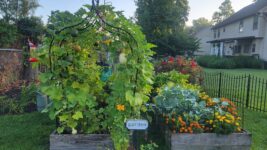
Creating an action plan for this year’s vegetable garden

It is April, and once the soil dries out and the warmer weather comes back, vegetable gardeners will be out working the soil and planting cool-season vegetables. Some of you are also tending to seedlings of cool and warm-season vegetables, which you have started indoors.
You have purchased your seeds for the warm-season vegetables you will plant next month, and you are all ready to get started growing vegetables. Or are you? Do you have a plan for your vegetable garden this season? It’s easy to be excited about the season now, the real challenge is to sustain that excitement through September, when your neck is sunburned and the skin on your hands is green from pulling weeds.
Before you jump garden boots-covered feet-first into the garden this spring, think about developing a plan for your vegetable garden by answering these questions:
How will you control weeds?
Weeds challenge many vegetable gardeners. Now is a good time and think about the weed-management challenges you have faced in previous seasons and develop a plan to keep those weeds under control in your vegetable garden this season. Will you depend on organic control methods to keep these weeds under control, or will you depend on herbicides?
Remember that mulches are one of the most effective weed control tactics we can employ in the vegetable garden. There are many benefits to applying mulch to the vegetable garden, and perhaps the greatest benefit of mulch is weed control, particularly between rows and between transplants.
Organic mulches, such as straw, paper, cardboard, cover-crop residues, leaves and wood chips provide the added benefit of adding organic matter to the soil as they decompose.
How much fertilizer do you need to apply?
Do you know exactly how much fertilizer or lime you need to apply to your vegetable garden this year? While we know the approximate amount of macronutrients needed by certain vegetable crops, the only method for figuring out how much of those nutrients are available in your soil this season is to have your soil tested.
Early spring is a good time to have the soil tested. Soil testing information is available at go.osu.edu/franklinsoiltesting.
More:Have you tested your garden soil? Here’s what you should know
Many native soils in Greater Columbus are naturally high in pH and rarely require the addition of lime, as most vegetable crops require slightly acidic soils with a pH of 6.5 to 6.8.
Do you need to amend your soil?
No matter the type or texture of the soil present in your garden, the addition of compost and other organic matter can improve the health of your soil and improve water-holding capacity and root penetration.
Soils high in clay or shale can benefit the most from the addition of organic matter. If you don’t already have a compost pile, consider starting one this season so you can recycle the nutrients and organic matter from your garden.

Has the size of your garden overwhelmed you in previous seasons?
Have you purchased too many vegetable seeds this year? Many gardeners buy more seeds than they need, or too many different vegetables, and if they plant all of these seeds, the garden may become overwhelming at some point.
If you’ve experienced this in previous seasons, consider cutting back the size of your planting, or even reducing the number of different vegetables you grow. Determine which vegetables are your absolute favorites and rotate other vegetables out of the garden this season. While gardening is hard work, it should also be satisfying and enjoyable to the gardener.
What is your plan for irrigation?
While we always hope for adequate rainfall throughout the entire growing season, there will always be certain times each year when the vegetable gardener will need to irrigate the garden. What is your plan for watering? Have you considered setting up some type of trickle irrigation system?
Even a simple soaker hose is an effective way to supply soil moisture for your plants. Drip-irrigation systems and soaker hoses are the most effective tools for delivering water efficiently to the root zone of plants. Avoid the use of overhead sprinklers as they create the perfect environment for the development of pathogens, which cause plant diseases.
What is your insect-management plan?
Most gardeners know there are good bugs and bad bugs in the vegetable garden, and maintaining populations of good bugs can often keep the populations of bad bugs below levels where they cause widespread damage to plants. Most synthetic insecticides can kill the good bugs, along with the bad bugs.
Gardeners who wish to manage insects in the vegetable garden should consider using an integrated-pest-management approach where you continually scout the garden for pests and then use cultural and biological controls to keep populations of harmful pests low.
The use of synthetic insecticides in the vegetable garden should only be used when cultural and biological controls fail to keep insect populations below levels at which they cause significant damage.
How will you measure your success this season?
What’s your plan for fun in the garden this year? Are you planting some vegetables that you have never grown before? What vegetable or variety are you most excited to grow this season? Gardening should be fun, so think about what gives you the most joy in your garden and do more of that! And also, have a plan for addressing the challenges that are certain to crop up this season.
Mike Hogan is Extension Educator, Agriculture and Natural Resources and associate professor with Ohio State University Extension.
hogan.1@osu.edu



